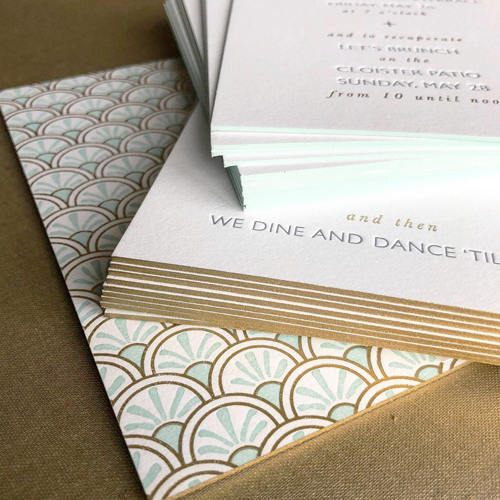WORDING THE
INFORMAL WEDDING INVITATION
Informal and casual weddings set the tone with well-worded and visually illustrative invitations. Etiquette wording helps communicate your tone clearly and gives your guests a confident starting point.
This is what you and your designer need for the etiquette of informal or casual invitation wording.
What makes an event formal or informal? The time of day is the best place to start. Events before 6 pm are considered informal. Among the socially sophisticated, formal attire is not brought out before this hour.
Today, many ceremonies start at 5 p.m., with a reception immediately following, and often still use formal language. Weddings and events before 5 p.m., while lavish and upscale, are considered informal by etiquette standards.
Last, is your wedding in a place of worship or sanctuary? This also determines the details of the wording.
Below are some wording scenarios and your line-by-line explanation of why the rules are applied, so you can make knowledgable decisions for various situations.
The Afternoon Church Wedding
Mr. and Mrs. Thomas Henry Williamson
request the honour of your presence
at the marriage of their daughter
Emily Rose
to
Mr. Michael John Lockhart
Saturday, the sixth of March
Two thousand twenty-seven
at half-past four o’clock
First Presbyterian Church
One West Putnam Avenue
Greenwich, Connecticut
The Casual Wedding
Morgan and Henry Williamson
request the pleasure of your company
at the marriage of their daughter
Emily
to
Mike Lockhart
Saturday, March 6, 2027
2 o’clock
at home
16523 Pairsol Avenuue
Greenwich, Connecticut
line-by-line on the informal and casual invitation…
Parents are hosting together and are married. Her name is first, followed by his and their common last name.
If hosts use their titles, they also use the groom’s. If they do not, no one uses titles. Same for middle names. Consistency is key.
The British spelling of “honour” is used only because this is a religious ceremony held in a sanctuary.
Emily does not have a title in either situation, which has nothing to do with gender roles, which is a common mistake.
In the case of Jewish weddings, “and” is often used instead of “to.”
Notice that “on” is not used before Saturday.
In formal language, half-after is correct. Half-past is informal or casual.
The location maintains the street address if it is not a major landmark.
Numerals can be used, or not, but be consistent.
The city and state, or for large cities, only the city is named.
Zip codes are never used.
Mind what is upper and lower case.
Finally, the invitation reads as one grammatically correct sentence (without punctuation). As you add or remove content for your situation, keep this in mind.




